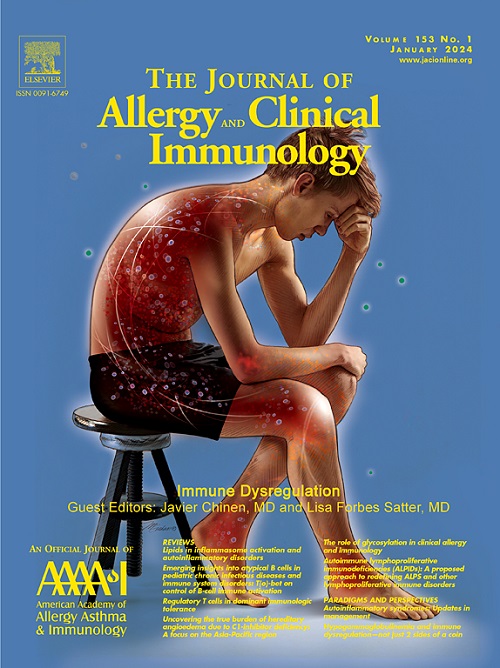嗜酸性粒细胞性食管炎(EoE):最新指南的过敏和免疫学观点。
IF 11.4
1区 医学
Q1 ALLERGY
引用次数: 0
摘要
2025年1月,美国胃肠病学学会(ACG)发布了关于嗜酸性粒细胞性食管炎(EoE)诊断和治疗的最新指南。这些新的指南纳入了EoE的病理生理学、危险因素、自然史和治疗方面的最新信息。由于这些指南主要是为执业胃肠病学家准备的,这篇范例和观点文章总结了过敏和免疫学社区的关键建议。此外,随着EoE的患病率和医疗负担持续增加,受影响的人群主要是过敏个体,以及低侵入性监测技术即将出现,我们讨论了过敏症专家可以帮助诊断和管理EoE的关键手段。特别是,过敏症专科医生可以参与他们的过敏患者中细微的EoE症状的筛查,协助优化其他过敏合并症的管理,提供有关消除饮食的教育,并促进疾病的长期监测。过敏症专家是唯一准备治疗整个过敏个体,而不仅仅是过敏的食道,并应准备共同管理这些病人与胃肠病学家。本文章由计算机程序翻译,如有差异,请以英文原文为准。
Eosinophilic Esophagitis (EoE): Allergy & Immunology Perspective on the Updated Guidelines.
In January 2025, the American College of Gastroenterology (ACG) published updated guidelines on the diagnosis and management of eosinophilic esophagitis (EoE). These new guidelines incorporated updated information on the pathophysiology, risk factors, natural history, and treatment of EoE. As these guidelines were primarily intended for practicing gastroenterologists, this Paradigm and Perspectives article summarizes the key recommendations for the Allergy & Immunology community. In addition, as the prevalence and healthcare burden of EoE continues to increase, the population affected is primarily allergic individuals, and less-invasive monitoring techniques are on the horizon, we discuss the key means by which allergists can contribute to the diagnosis and management of EoE. In particular, allergists can participate in screening for subtle EoE symptoms among their allergy patients, assist in optimizing the management of other allergic comorbidities, provide education about elimination diets, and facilitate the monitoring of disease over time. Allergists are uniquely poised to treat the entire allergic individual, rather than just the allergic esophagus, and should be prepared to co-manage these patients with gastroenterologists.
求助全文
通过发布文献求助,成功后即可免费获取论文全文。
去求助
来源期刊
CiteScore
25.90
自引率
7.70%
发文量
1302
审稿时长
38 days
期刊介绍:
The Journal of Allergy and Clinical Immunology is a prestigious publication that features groundbreaking research in the fields of Allergy, Asthma, and Immunology. This influential journal publishes high-impact research papers that explore various topics, including asthma, food allergy, allergic rhinitis, atopic dermatitis, primary immune deficiencies, occupational and environmental allergy, and other allergic and immunologic diseases. The articles not only report on clinical trials and mechanistic studies but also provide insights into novel therapies, underlying mechanisms, and important discoveries that contribute to our understanding of these diseases. By sharing this valuable information, the journal aims to enhance the diagnosis and management of patients in the future.

 求助内容:
求助内容: 应助结果提醒方式:
应助结果提醒方式:


